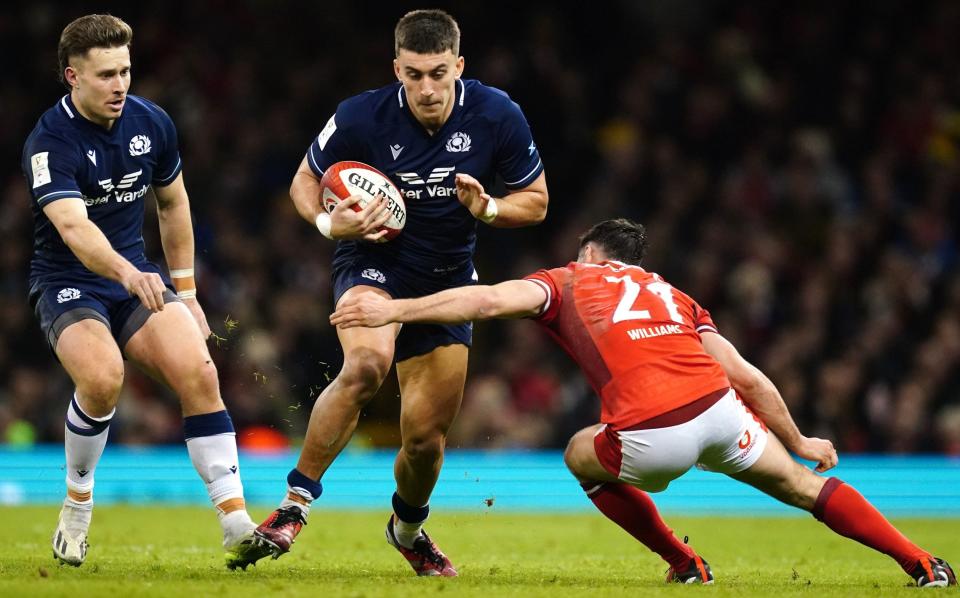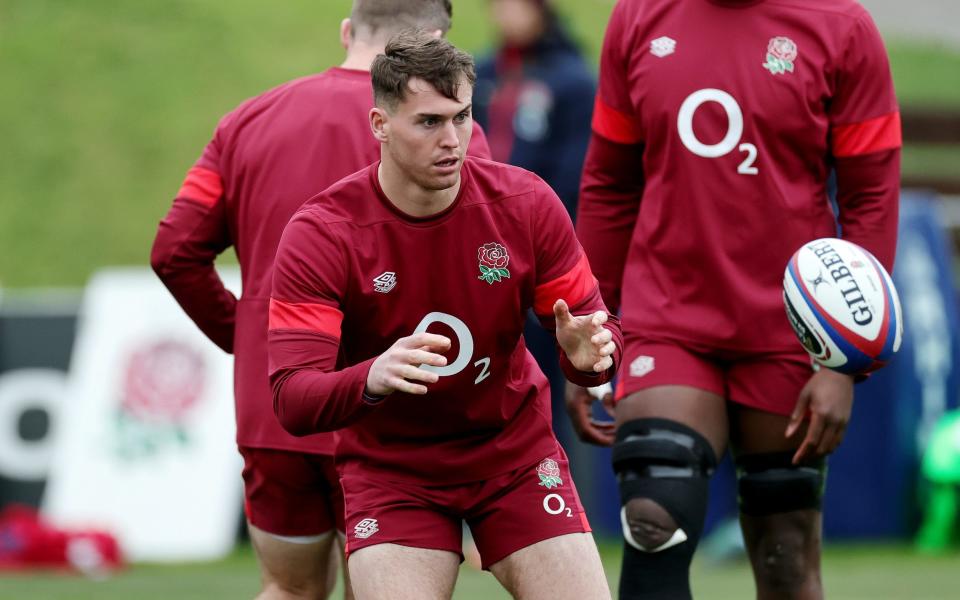The frantic tussle between home nations for rugby’s dual-qualified talent

The quintet who made their England debuts last weekend in Rome – Chandler Cunningham-South, Fraser Dingwall, Immanuel Feyi-Waboso, Ethan Roots and Fin Smith – all had one interesting trait in common; they all qualified to play for other countries as well as England.
If you were being cynical, perhaps you could argue that capping them all against Italy was a shrewd move by head coach Steve Borthwick to avoid losing those talented players to other countries down the road.
The move by World Rugby at the end of 2021 to relax restrictions over players being “captured” by one union, with players having previously only been able to play international rugby ever for that team, has meant that what remains a huge, career-defining decision does not come with the same limitations if a player falls out of favour. Players can now switch countries after a three-year stand-down period providing they were either born or have a parent or grandparent from that country, with an example in this year’s Six Nations being new Scotland prop Alec Hepburn, who was capped by England back in 2018.
However, the arms race to try and lure top talents to represent a country at Test level remains as fervent as ever and also begins earlier than you may realise, from when rising talents are still at school level.
Cam Redpath is an interesting example. Back in 2018, Redpath was called up to train with the England squad when he was just 17 and still a pupil at Sedbergh. The son of former Scotland captain and scrum-half Bryan Redpath, had it not been for an ill-timed ACL injury then there was a strong chance that Redpath would have been capped by England on the summer tour to South Africa while he was still a teenager.
Eddie Jones and England subsequently moved on, with Redpath once he returned to full fitness playing for the England Under-20s in the summer of 2019. Eighteen months later, Redpath was called up to Scotland’s squad for the Six Nations, making his debut at inside centre in a victory against... England. In a parallel universe where his knee remains unscathed, Redpath might have been wearing white instead of blue on that historic day for Scotland when they won at Twickenham for the first time since 1983.

What initially began with “Exiles” clubs for Scotland, Wales and Ireland within the English system, offering a base for those abroad to reconnect with home, has gradually evolved into the talent identification programmes of today. For Scotland, that operation is essential given their smaller player pool and only having two professional teams in Glasgow Warriors and Edinburgh, hence 23 players in their squad being dual-qualified either through residency or family ties.
Through the Scottish Qualified programme (SQ) players can either register themselves or be nominated, with about 50-60 volunteer coaches then holding training sessions and mapping out individual pathways for young players while including them in age-group squads, keeping in touch with parents, schools and universities. Run by Rob Brierley and Peter Walton, with the latter in charge of the transition stage linking under-19 players with universities and clubs, the programme receives submissions from coaches, teachers and parents all across the world.
Ben White, now Scotland’s starting scrum-half who qualifies through a grandparent, initially began with Scotland’s under-16s before joining the English setup, going on to captain England’s under-20s and playing for England against the Barbarians before the call came from Scotland.
Wales meanwhile have the WRU Exiles programme, first launched in 1990, with players aged 13 and upwards registering online and then attending between three to four events per year and working their way up through the age groups. Nick Tompkins and Will Rowlands are both graduates of that programme.
At the time of writing, of the 228 players called up during the Six Nations, 72 are dual-qualified. That number drops down to 63 when you filter out players who are eligible to play for countries who have not been to a Rugby World Cup – England’s Maro Itoje, Beno Obano and Nick Isiekwe (Nigeria), France’s Cameron Woki (Democratic Republic of Congo), Gael Fickou (Senegal) and Dany Priso (Cameroon), Ireland’s Josh van der Flier (Netherlands) and Italy’s Alessandro Izekor (Nigeria) and Marco Manfredi (Germany). Sebastian Negri, the Azzurri forward, was born in Zimbabwe but also qualifies for South Africa, so has not been counted.
There are also seven dual-qualified players in the Six Nations squads who remain uncapped. Potential England backs Oscar Beard and Tom Roebuck qualify for Wales and Scotland respectively. The exciting Toulouse forward Emmanuel Meafou, currently injured but certain to play for France when fit, qualifies for Australia, New Zealand and Samoa. Ross Vintcent, one of Exeter’s breakthrough players now called up by the Azzurri, could represent South Africa, while Scotland moved to bring in Sale’s Arron Reed (England) and Ross McCann (England and Ireland).

Receiving a call-up to play Test rugby for many will be the greatest moments of their lives. When those calls enquiring about availability come from countries who you would never play for – Louis Rees-Zammit swiftly turning down England back in 2019, for example – then the decision is easy.
Yet for those torn between representing multiple nations it can be a “really sensitive” situation, as described by one agent. At senior level the unions will approach clubs first about any call-ups, before players then discuss their options with their families and advisers. Those who are unsure about which team to represent may even make themselves available to be called up but then pull out if selected.
Fate, as seen with Redpath, has a part to play as well. If Feyi-Waboso after achieving three A*s had been accepted to study medicine at Cardiff University, then instead of heading to first Wasps and then Exeter where he is now finishing his medicine degree at the university while playing for Chiefs, he would probably would be running out at Twickenham on Saturday in the red of Wales.
Those are the big decisions which the next wave of future stars coming through will now face. Henry Pollock, the England back-row talent, qualifies for Scotland. Kepueli Tuipulotu, the England under-18s hooker, was born in Pontypool and his sister, Sisilia, plays for Wales. Wilhelm de Klerk has been one of Ireland’s top U20 performers and was born in South Africa. The battle for each union to win over those players is just beginning.

